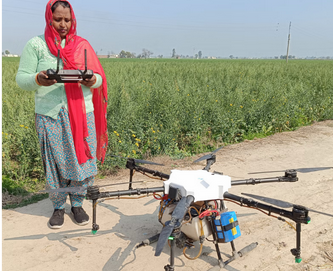News Excerpt:
The ‘NaMo Drone Didi Initiative’ was announced by the PM on 15 August 2023 to train 15,000 women-led Self-Help Groups (SHGs) in the use of agricultural drones.
The Objective of the Scheme:
- The scheme is aimed at training and equipping 15,000 women-led Self-Help Groups (SHGs) with agricultural drones.
- The idea is to offer farmers assistance in agricultural operations, such as crop monitoring, spraying fertilizers, and sowing seeds.
- This scheme will help rural women achieve self-sufficiency while simultaneously making the sector less labour-intensive.

About the scheme:
- This scheme was launched under the flagship Lakhpati Didi project, with an investment of Rs. 1261 crore.
- Drones will be given to female Self-Help Groups (SHGs) so they can use this technology to support their livelihoods.
- Currently, there are 81 drone training centres, imparting basic drone operating skills to women.
- District authorities such as local collectors help handpick the women who could be recommended for training.
- The National Rural Livelihood Mission, under which these women self groups come, also recommends candidates.
- Once they finish the course, these women get the Remote Pilot Certificate (RPC), the certification required to fly drones, from the DGCA and can take up assignments as ‘Drone Didis’.
- Since its official launch, the central government bears 80 percent cost of these drones while the trainees pay the rest.
- In the interim budget announced this year, the government earmarked Rs 500 crore for the ‘NaMo Drone Didi’ initiative.
Eligibility criteria under the scheme:
- The applicant should be a woman.
- The applicant should belong to the lower economic groups.
- The applicant should be involved in agricultural activities.
Concerns related to scheme:
- According to some agriculture policy analysts, agriculture has, over the years, become the dominion of a few companies and it’s in their interests to further the scheme. The idea, he adds, is not to empower women but to help boost the GDP.
- According to critics of the scheme, the application of drones is not to help Drone Didis in improving their finances, because there are many other ways to do that.
- It’s only a scheme to promote the use of drones. As more drones are sold the more the GDP grows.
SIgnificance of the scheme:
- Empowerment of Women: The scheme empowers women by providing them with the skills and tools needed to participate actively in agricultural operations. It enhances their role in decision-making processes, promotes gender equality, and contributes to their economic empowerment.
- Agricultural Advancement: The use of drones in agriculture can revolutionize farming practices.
- Drones can help in crop monitoring, pest control, and precision agriculture, leading to increased productivity and reduced environmental impact.
- By providing access to drone technology, the scheme promotes modern and efficient farming techniques.
- By using drones, the negative effects of pesticides, DAP, and urea on the body can be minimized and the amount of fertilizer can be optimized.
- Reduced Labor Intensity: By automating tasks such as crop monitoring, spraying fertilizers, and sowing seeds, drones reduce the labor intensity of agricultural operations.
- This is particularly beneficial for women, who often bear a significant burden of agricultural work in rural areas.
- The Indian Farmers Fertiliser Cooperative (IFFCO), a farmer-owned fertilizer collective and India’s largest fertilizer company has been part of the NaMo Drone Didi Scheme since its inception.
- IFFCO produces two major fertilizers: - nano urea and nano DAP, both of which the current government has been promoting.
- Financial Support: The scheme provides financial support to women by subsidizing the cost of drones and training.
- This reduces the financial barrier to entry for women who wish to engage in agricultural drone operations, making the technology more accessible and inclusive.
- The scheme is a significant step towards empowering women, enhancing agricultural productivity, and promoting sustainable rural development.
What is a drone?
- A drone is an unmanned aircraft. Drones are more formally known as unmanned aerial vehicles (UAVs) or unmanned aircraft systems.
- Essentially, a drone is a flying robot that can be remotely controlled or fly autonomously using software-controlled flight plans in its embedded systems that work in conjunction with onboard sensors and a global positioning system (GPS).
Way Forward:
The 'NaMo Drone Didi Initiative' is a significant step towards empowering women in agriculture, enhancing productivity, and promoting sustainable development. Despite criticisms, the scheme's focus on skill development, financial support, and technological advancement underscores its potential to transform rural livelihoods and agricultural practices.


